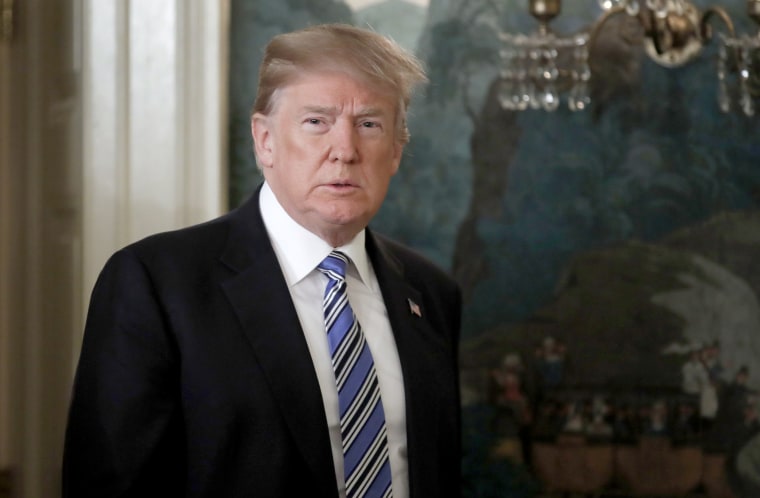News analysis
WASHINGTON — The day after a shooter killed 17 people at a Florida high school, President Donald Trump offered comforting words — for gun owners.
"We are committed to working with state and local leaders to help secure our schools and tackle the difficult issue of mental health," Trump said in brief remarks at the White House. "It is not enough to simply take actions that make us feel like we are making a difference. We must actually make that difference."
Translation: Your guns are safe.
"That's very encouraging that he's not mounting up with the anti-Second Amendment posse," said Larry Pratt, executive director emeritus of the Gun Owners of America, an advocacy group based in Virginia. "The response from gun owners will be principally that he didn't say the kind of things Hillary Clinton would have said had she been president and the way Barack Obama reacted to other situations like this."
No modern American president has had a closer bond with gun owners than Trump, who won 62 percent of their votes in 2016, then promised the National Rifle Association in April 2017 that he would "never, ever infringe on the right of the people to keep and bear arms."
And on Thursday, against the backdrop of calls for tighter gun restrictions from Democrats, some Republicans and several students at Marjory Stoneman Douglas High School, in Parkland, Florida — where a former student gunned down 17 people on Wednesday — Trump signaled again that his focus is on the mental state of shooters, not the weapons they use to commit their crimes.
He didn't mention guns at all.
"The fact that the president didn't talk about rifles today ... that was good," said Chris Waltz, president and CEO of AR-15 Gun Owners of America, a Warner Robbins, Ga.-based company that sells semi-automatic rifles and claims a community of enthusiasts numbering more than 500,000. "He's been, so far, the most outspoken president on gun issues, as far as supporting the Second Amendment."
The aftermath of any mass shooting is an anxious time for gun-rights groups, many of which worry that sentiment on Capitol Hill or in the administration could shift in response.
"We’re always concerned after a tragedy that the response will be either poor, misguided or just emotional," said Dudley Brown, president of the National Association for Gun Rights.
In particular, he said he was discomfited by Treasury Secretary Steve Mnuchin's response to a question from Rep. John Lewis, D-Ga., at a House Ways and Means Committee hearing Thursday.
"I will say personally, I think the gun violence — it's a tragedy what we've seen yesterday, and I'd urge Congress to look at these issues," Mnuchin said.
While Mnuchin didn't go so far as to back any particular action, the words struck Brown as "intimating gun control" and a potential waver in the administration's stance.
"Our concern is the canary in the coal mine," he said.
For years, gun control advocates — most of them Democrats — have engaged in futile and frustrating efforts to enact new measures. Now, in the wake of Thursday's massacre they are escalating their rhetoric again, perhaps in hopes of putting more public pressure on Republican lawmakers to join them.
"If you are not working today to try to fix this, to try to stop these shootings, then you're an accomplice," Sen. Chris Murphy, D-Conn., a leading voice in favor of tightening gun laws, said Thursday.
Many gun owners believe Murphy's answer is the wrong one. Rather than focusing on how to crack down on guns, they say, the government should do more to ensure that people with mental health problems don't have access to weapons and that schools are more secure.
And though the only gun policy-related law Trump has signed so far has been a measure repealing an Obama-era rule that made it more difficult for those with mental illnesses to purchase guns, those are the topics he said he would focus on.
Some gun-rights advocates say schools are soft targets for shooters because law-abiding citizens aren't allowed to pack weapons on their grounds. In their view, elected officials should roll back laws that ban guns on campuses because they are counterproductive.
"You have to conclude these gun free zones are murder magnets," Pratt said. "Anybody legally carrying should be able to be on school property, the same as they can be in a supermarket or an automobile lot."
Trump has endorsed a repeal of the federal gun-free school zones law in the past, and it could be that he sees such action as part of his promise to increase safety at schools.
With Republicans in control of both chambers of Congress — and Democrats holding enough seats to sustain a filibuster in the Senate — it seems highly unlikely that Congress will send Trump any major change to gun laws anytime soon.
On Thursday, gun-rights advocates praised Trump's expressions of sympathy for the victims, their families and survivors of the shooting. They were reassured by what he's said in the past — and what he didn't say at the White House — about his universe of solutions for preventing the next deadly attack.
"I’m confident that the president meant what he said: that he’s not going to pursue a potential solution that’s going to infringe on our constitutional rights," said David Bozell, president of the conservative group For America. "Gun owners like myself, we want the ability to defend our families against bad guys."
